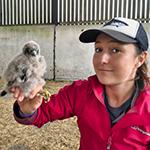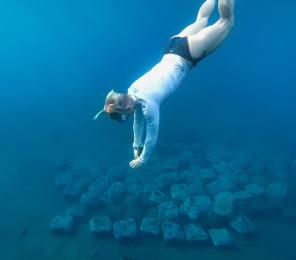
Georgia Jones, Ph.D.
Georgia considers herself a conservation ecologist and has accumulated experience across the majority of taxa (birds, reptiles, amphibians, fish, insects and mammals). In particular, she has experience in conservation status assessment, protected area planning, spatial analyses, and stable isotope analysis. Her main research interests involve the trophic ecology and movement patterns of predators, and her current work focuses on sharks and birds of prey.
Why are you interested in your research focus?
I have worked on several species of shark around the world and conducted my PhD research on great whites. I now work largely on porbeagles, blue, and thresher sharks in the UK. I have used Baited Remote Underwater Video and acoustic telemetry to study shark movement and habitat use, and now enjoy applying stable isotope analysis to investigate their trophic ecology. Similarly, I use stable isotope analysis, camera traps and tags to study the trophic ecology of UK raptors. I am particularly interested in the effects of sex, life-stage and individual variation in this arena.
I also work very closely with the recreational angling community through SharkStuff, a small charity that I founded in 2015, and Shark Hub UK, a collaboration between scientists and anglers which them together as equals. I am also a member of RaptorLab, a research group studying spatial ecology and predator-prey interactions of UK raptors.
I want all of my research to have tangible conservation benefits. This project involves looking into mitigation of the biggest threats facing the planet today; climate change, habitat destruction and biodiversity loss, in the context of coral reefs, which are vitally important for the health of the oceans and human communities. The project also directly reflects my interests and expertise in predator trophic ecology and community engagement, particularly with regards to sharks.
A great moment in the field
My first encounter with a shark was very memorable! I was working on a tiny island in the Seychelles, monitoring a newly translocated population of the endemic and critically endangered Seychelles black paradise flycatcher. I went for a snorkel one afternoon and was swimming at the surface when I looked up and saw a shark just a few feet away from me. We both froze for a split second that felt like a minute and looked at each other in shock before the shark sped off into the blue. It was a short encounter with a small blacktip reef shark but it changed my life. I’d always held a fascination with sharks (partly due to watching Jaws when I was way too young), but that encounter ignited a passion to study them that has not dissipated since.
Education
- BSc Zoology, Cardiff University, UK
- MSc Wildlife Management and Conservation, University of Reading, UK
- PhD Individual, Sexual and Ontogenetic Variation in the Trophic Ecology of the Great White Shark, University of Sussex, UK
